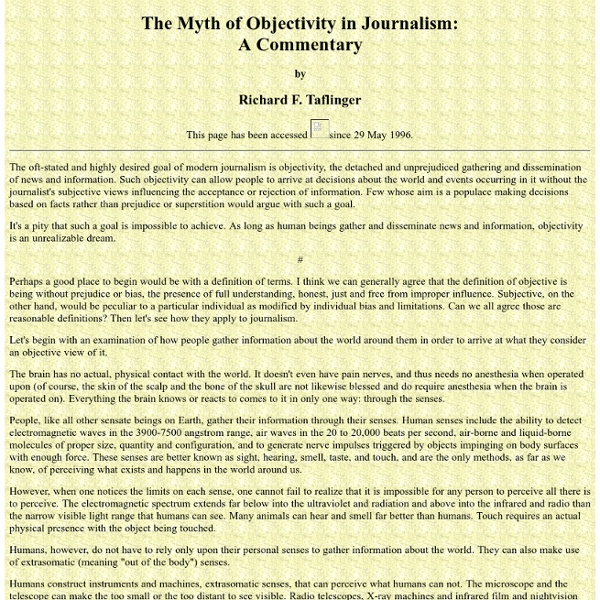Journalism Ethics: Objectivity
In the chapter for last week, Merrill discussed all the ways that journalists can, inadvertently or deliberately, become propagandists -- the opposite of objective observers and reporters. In this week's chapter on general semantics, he says that close attention to the use of language is one way journalists (and everyone else, too) can come as close as humanly possible to truthful communication. General semantics is a way of looking at how people use language and how the words they choose affect human behavior. Probably its best-known idea is that "the map is not the territory." That is, the word we use to define or describe something is just that -- a word.
Journalism, Objectivity, Objectivity in News Reporting, Fox News, MSNBC
Is objectvity dead? That's the trendy argument of the moment, espoused by pundits like Jeff Jarvis and others. They say objectivity in journalism is an outdated remnant of the pre-digital news era, and that 21st century reporters should spew their opinions whether they tack left, right or center. This may be a trendy idea, but as far as I'm concerned it's one that's as dumb as they come. The argument the anti-objectivity types make seems to go as follows: True objectivity is impossible, since all humans, reporters included, have their own set of biases and preconceptions.
Objectivity (journalism)
Journalistic objectivity is a significant principle of journalistic professionalism. Journalistic objectivity can refer to fairness, disinterestedness, factuality, and nonpartisanship, but most often encompasses all of these qualities. Definitions[edit]
Bob Schieffer, Ron Paul and journalistic "objectivity" - Glenn Greenwald
CBS News‘s Bob Schieffer is the classic American establishment TV journalist: unfailingly deferential to the politically powerful personalities who parade before him, and religiously devoted to what he considers his own “objectivity,” which ostensibly requires that he never let his personal opinions affect or be revealed by his journalism. Watch how thoroughly and even proudly he dispenses with both of those traits when interviewing Ron Paul last Sunday on Face the Nation regarding Paul’s foreign policy views. You actually believe 9/11 was America’s fault?
Objectivity in Journalism
DAVID BROOKS There is some dispute about whether objectivity can really exist. How do we know the truth? Well, I’m not a relativist on the subject. I think there is truth out there and that objectivity is like virtue; it's the thing you always fall short of, but the thing you always strive toward. And by the way, I think that opinion journalists have to be objective just as much as straight reporters. Opinion journalists, too, have to be able to see reality wholly and truly.
UNT talk-Objectivity in Journalism
University of North Texas Nature Writing Symposium talk: “Changing the World One Story at a Time” April 2007 Copyright © 2007 Wendee Holtcamp – bohemian@wendeeholtcamp.com
What is objectivity in journalism?
Objectivity is expressing or dealing with facts or conditions as perceived without distortion by personal feelings, prejudices or interpretations. Objectivity, as defined by the school of media ethics, means standing so far from the community that you see all events and all viewpoints as equally distant and important or unimportant for that matter. It is employed by giving equal weight to all viewpoints—or if not, giving all an interesting twists, within taste.
The Fading Mystique of an Objective Press
It is worth noting that non-partisan (i.e., objective) reporting coexisted easily in the same penny papers with such pungent sensationalism. “Neutrality will sleep with anyone,” as the saying goes. Right there at the creation of the modern press, paradoxes abounded. Bennett and other penny publishers touted nonpartisanship, yet on issues that were universally applauded the pennies were rabid advocates. Bennett for example was always super patriotic and always proslavery, both being conducive to pleasing his readers and thus to producing profits. During the 20th century, the ideal of objectivity in news coverage went from strength to strength.



